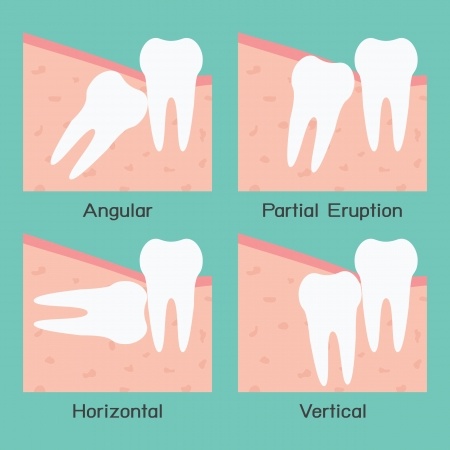Wisdom teeth, also known as the third molars, are usually the last set of permanent teeth to develop. Most people would have four wisdom teeth, two on the upper jaw and two on the lower jaw. These teeth usually develop between the ages of 16-21, although they may erupt later for some people.
Fun Trivia
1) No one knows why DNA creates wisdom teeth.
Why do wisdom teeth grow when they seem to be obsolete and should be taken out eventually? There is no known scientific knowledge on why our DNA creates wisdom teeth after birth and its function. For wisdom teeth to form, the tissue that starts the process of tooth building has to migrate back in the mouth to interact with the back jaw tissue. If this migration doesn’t happen, then no tooth will grow there.
2) People in East Asia have fewer wisdom teeth.
Eskimo women have larger jawbones because of the need to chew on leather to soften it. People of a culture have reached the point where they don’t use a trait, they may lose it. [1] People in East Asia have fewer wisdom teeth, but whether it is due to evolution or culture, is still debatable.
There is no known great evolution advantage that comes with the lack of wisdom teeth, but we will never know where evolution may bring us!
3) Wisdom teeth do not necessarily always grow in fours.
It is normal to have one or more missing wisdom teeth for some people. Wisdom teeth may cause trouble for some and may grow out peacefully for others.
Lose the Wisdom Teeth
Often, we think that if our wisdom teeth are not causing pain, we should leave them alone. After all, why fix something that is not broken.
Here is why it is time to get wise about wisdom teeth.
Every person is unique, but generally, we will advise the removal of wisdom teeth when there are changes in the mouth, such as pain, infection, tooth decay, or gum disease.
The condition of our mouth constantly changes, so wisdom teeth that are not removed may pose a potential problem later on. Impacted wisdom teeth, specifically, are frequently food traps and breeding grounds for bacteria. Thus, maintaining their cleanliness is difficult and infection is very common.
The younger one is, the easier the removal of the wisdom teeth (and the faster the recovery time), as the bone is more elastic and the roots are shorter. With proper management, the procedure is smooth and seldom causes any significant swelling or discomfort afterwards.
Regular dental visits are important so your dentist can evaluate not just your wisdom teeth, but also your overall oral health to help you prevent and manage dental disease and achieve optimal oral health.






